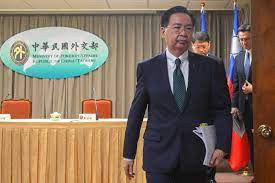TAIPEI: Honduras announced on Saturday that it had broken off diplomatic relations with Taiwan, a move that drew an immediate rebuke from Taipei as Tegucigalpa switches allegiances to China.
Honduran Foreign Minister Enrique Reina said that upon instructions from President Xiomara Castro he “has communicated to Taiwan the decision to cease diplomatic relations,” a ministry statement said.
The formal severing of ties comes two days after Reina’s trip to Beijing to discuss the establishment of bilateral diplomatic ties, and 11 days after Castro first announced the switch.
China considers self-ruled democratic Taiwan as a part of its territory, to be retaken one day by force, if necessary. Under its ‘One China’ policy, it does not allow countries to recognise both Beijing and Taipei.
“The government of the Republic of Honduras recognises the existence of only one China in the world, and that the government of the People’s Republic of China is the only legitimate government that represents all of China,” the Honduras Foreign Ministry said Saturday.
“Taiwan is an inalienable part of Chinese territory,” it said.
“As of this date, the government of Honduras has communicated to Taiwan the rupture of diplomatic relations, committing to no longer having any relationship or contact of an official nature with Taiwan,” it added.
In a press conference held shortly after, Taiwan Foreign Minister Joseph Wu accused Castro of being misled by Chinese promises of financial aid for her country.
“President Castro and her ruling team have been harbouring illusions on China and had brought up the issue of switching recognition on the campaign trail,” Wu told reporters at a press conference. “China has not ceased its attempts to lure away Honduras with financial incentives.”
Honduras’s move followed negotiations with China on building a hydroelectric dam in the country.
Wu announced that Taipei was similarly cutting ties with Honduras after Reina’s announcement.
The switch leaves Taiwan with 13 countries that formally recognise it over China, having lost several Latin American allies in recent years.
The United States remains Taiwan’s most significant ally, and largest weapons supplier, despite having switched recognition to Beijing itself in 1979.
Latin America has been a key diplomatic battleground for China and Taiwan since the two split in 1949 after a civil war.
Saturday’s development continues a trend in the region, with Nicaragua, El Salvador, Panama, the Dominican Republic and Costa Rica all switching diplomatic recognition to Beijing in recent years.
This week, Taiwan confirmed that President Tsai Ing-wen would be visiting Guatemala and Belize later this month, while also making stopovers in the United States.
Tsai Ing-wen will depart Taiwan on March 29 for the 10-day trip, stopping in New York and Los Angeles while en route to and from the Central American countries, according to the ministry.


